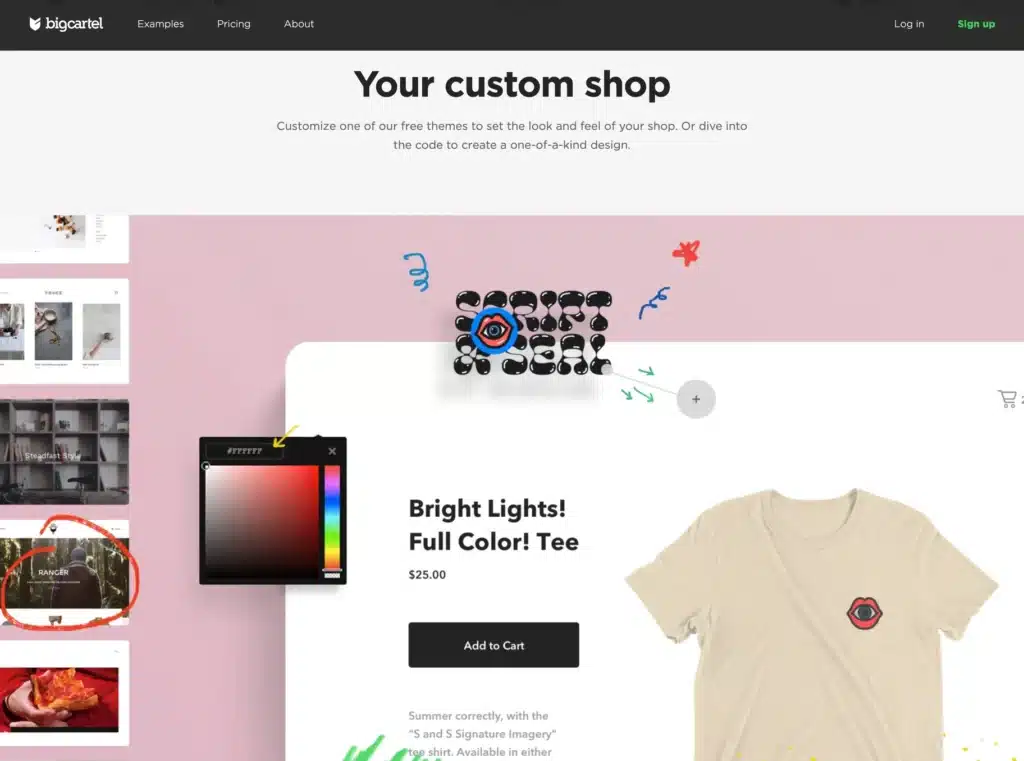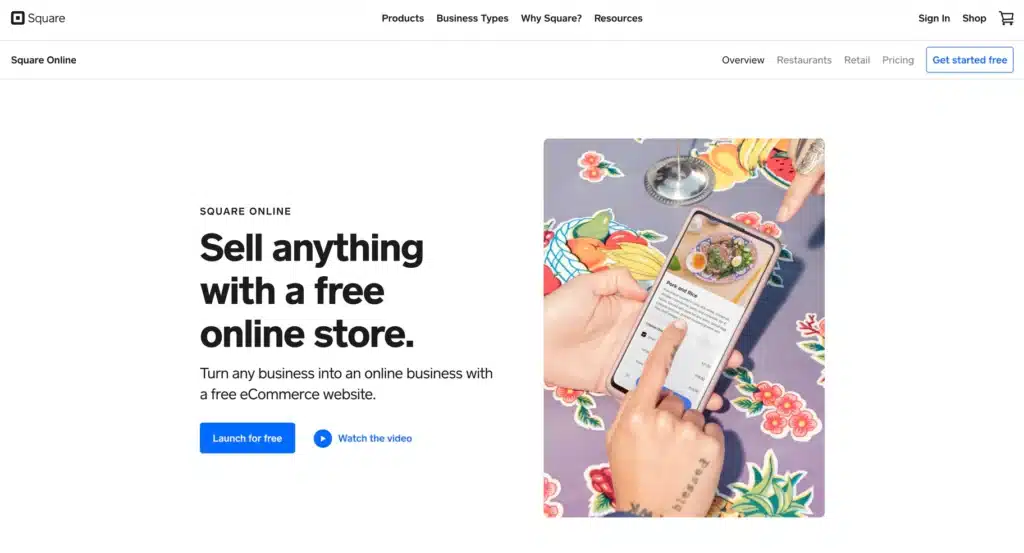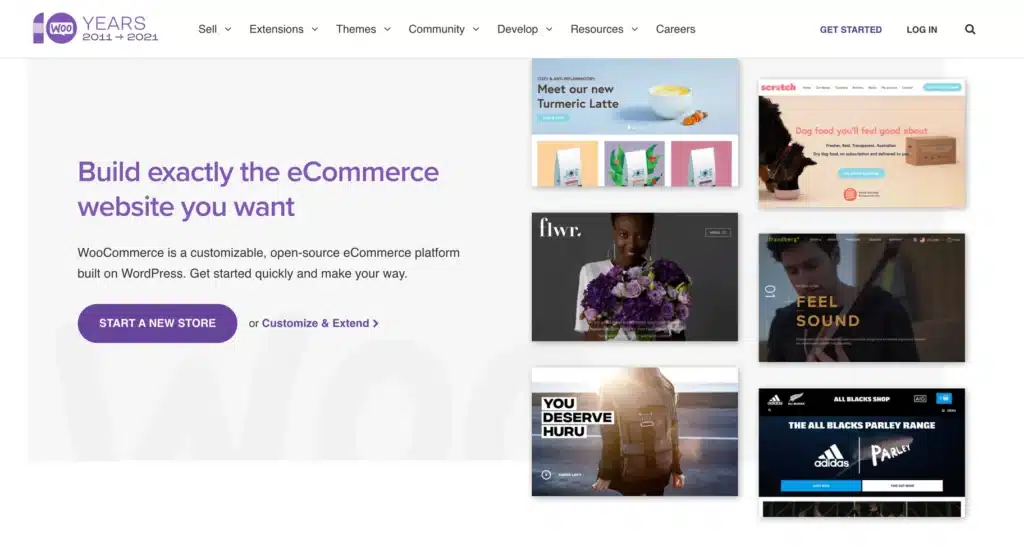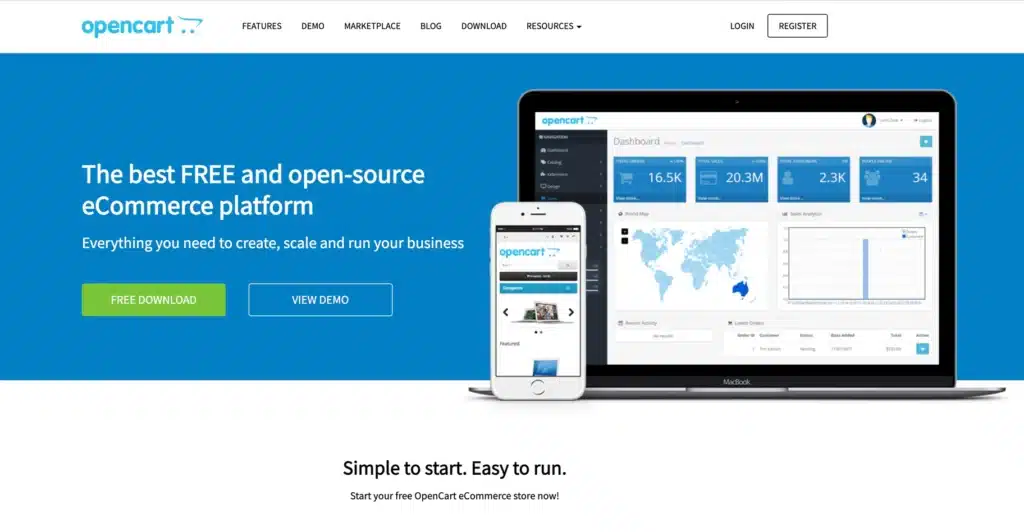Summary: Here are 10 Shopify competitors you should be aware of in 2022
Shopify is unbeatable for many reasons, such as dropshipping or being an all-in one ecommerce platform.
There are many companies that can pose a challenge to your business. It all depends on how complex a store is and what sales and marketing features are required.
These are the 10 top Shopify competitors available to SMBs and Enterprise companies.
- Wix: Make it easy to sell online
- Squarespace: Design a beautiful and elegant storefront
- Big Cartel: Manage basic online stores
- Square Online: Connect offline sales and online sales
- WooCommerce: Add a WordPress online store
- Zyro – Create an ecommerce site in minutes
- BigCommerce: Manage large product ranges
- Volusion: Check out the performance of your store at a glance
- Magento: Modify your store with code
- OpenCart: Get ecommerce functionality free of charge with OpenCart
Shopify competitors to small and medium-sized business
1. Wix: simple drag-and-drop website builder

Wix enjoys a strong reputation for being user-friendly, which is why it consistently ranks among the top Shopify competitors. You can create stunning, customized storefronts with its drag-and drop website builder.
Wix lets you choose from over 100 templates for ecommerce and allows you to manage all aspects of your site, including order tracking and shipping labels printing through the dashboard. Wix offers a large App Market that allows you to find tools to improve the functionality of your store. You’ll find many useful features, from flexible payments to loyalty programs, on Wix.
Wix comes with some drawbacks. Wix doesn’t allow you more than 100 pages for your site. You won’t be able to use TikTok as a sales channel, so setting up a Wix store might mean losing out on sales.
Pros:
- Simple drag-and-drop functionality
- Ecommerce apps that work
- New features are added regularly
Cons:
- No dropshipping support
- Limited storage
Price: $17-$35 per month
2. Squarespace: Beautiful online store templates

Squarespace is all about making your store stand out. This website builder provides over 100 online store templates. Many of these templates are simple and elegant. They’re also all mobile-responsive.
Squarespace has a remarkable range of ecommerce capabilities. Squarespace lets you sell unlimited digital products and physical products. You can also send abandoned cart recovery emails and create shipping zones. Tax calculations are automatically calculated. This website builder makes it easy to create your online store.
Squarespace is limited in the number of payment options you can offer to your customers. Squarespace can accept payments via Stripe or PayPal. But that’s all. International sales can have a negative impact on customer service.
Pros:
- Stunning, responsive templates
- Unlimited products included in every plan
- Native analytics feature
Cons:
- You have limited payment options
- Small app store
Price: $18-$40 per month
3. Big Cartel: An ecommerce solution to small, basic retailers

Big Cartel states it’s “built for small,” and is best suited to people just starting out, and those looking for basic selling features. Big Cartel merchants can access a variety of standard ecommerce tools including discount codes, and the ability to sell on Facebook.
Big Cartel makes creating an online shop easy with prompts, reminders, and a guide to help you. However, Shopify’s competitor to Shopify means that you will need to be able to program certain elements.
Big Cartel allows you to upload your own images to your online shop. But, images can only be edited by code. HTML/CSS editing only is available to paid users. You should not customize if you are on a free plan.
Pros:
- Easy onboarding
- Themes that are responsive and clean
- Social selling integration
Cons:
- No image editor
- Up to 500 Products
Price: $0-$19.99 per month
4. Square Online: Connect offline and online sales

Square is a simple, user-friendly, and powerful ecommerce platform. You can sell unlimited quantities of products, create gift coupons, and send abandoned-cart emails.
Square Online excels in integrating offline and online retail sales. Square Online can sync with any physical retail store to link your customer and inventory data. Square Online even offers a free version for those who are starting out in digital sales.
However, cross-channel simplicity can come at the expense customization. There are only five styles and 15 color options to choose from, so you can’t access a template collection. Square Online makes it easy, but it restricts your creativity.
Pros:
- A simple and clean dashboard
- For beginners, a free plan
- It is great for unifying offline and online sales
Cons:
- You have very limited customization options
- Limited customer service (specific hours and days)
Price: $0-$72 per month
5. WooCommerce: An ecommerce plugin for limitless customization

You can create an online shop on your WordPress website.
Yes, please.
WooCommerce, a WordPress plugin for free, adds ecommerce functionality. It supports product variants, allows you to show ratings and reviews, as well as a variety of extensions that will help you grow your store.
WooCommerce is not only a popular choice for ecommerce, but it also offers a wide range of ecommerce features. WooCommerce can be customized in the same way as WordPress’ core platform. You can also add custom widgets, such as share buttons, to make your pages more attractive and engaging. You can personalize the WooCommerce theme, or even create your custom theme, to further personalize your storefront.
WooCommerce is a time-consuming tool that requires you to install WordPress and set up hosting. WooCommerce’s steep learning curve might make it difficult to get started with ecommerce platforms.
Pros:
- Many themes and plugins
- You can easily integrate WordPress
- Active developer community
Cons:
- No built-in hosting
- Site maintenance to be performed by the user
Price: $0 per month + web hosting cost
6. Zyro: Build a functional store in a matter of minutes

Zyro is not as well-known and popular as Shopify’s competitors, but it is worth considering. Some of the more expensive plans include multilingual setup, abandoned cart recovery, and other ecommerce features.
One of the Zyro online store templates can be used to create your online store. Zyro offers a limited number of ecommerce themes. But the designs are sleek and modern. You can apply them in minutes and have a functional shop within minutes. Zyro is compatible with Amazon, Facebook, Instagram shops, and Instagram shops, to help you grow your sales channels.
What about Zyro’s weaknesses? There is one downside: you cannot change the template you have selected after you’ve chosen it. If you begin customizing a template but decide it isn’t for you, then you will need to make a new website. Zyro’s drag & drop elements are able to create five different types of content. Nothing else.
Pros:
- Easy to use website builder
- Help with content using AI tool
- Logo and slogan generator free
Cons:
- No template switching
- Setup of complex domains
Price: $9.90-$14.90 per month
Shopify competitors to large/enterprise firms
7. BigCommerce: Designed to handle large sales volumes

BigCommerce has been designed for large online sellers who deal with thousands products. This software offers a wide range of features that will help you manage large product collections, such as bulk editing and product categorization. To speed up the process of releasing newer variants, you can make changes to product variants for multiple items.
BigCommerce has many ecommerce tools available to you, including product management features. These include payment options that are multi-currency, abandoned cart emails and the ability to group customers in different ways to make it easier to sell to them.
BigCommerce may not be suitable for every retailer, despite all its features. BigCommerce doesn’t offer a solution that will work for you if your products are sold in both offline and online sales channels.
Pros:
- Excellent product management features
- Multiple sales channels
- Various templates
Cons:
- There is no integrated POS
- Limits on online sales
Pricing:$29.99 to$299.95 per monthly; custom pricing for Enterprise plans
8. Volusion: Amazing analytics and data tools

Volusion is a great site builder for data lovers. This ecommerce platform isn’t for everyone, but it’s easy to use. Access to sophisticated tools such as abandoned cart recovery and personalized invoices are available for increasing sales. Your site will stand out with a variety of branding options.
Volusion’s greatest strength is analytics. The extensive reporting section gives you all you need to know about customer purchasing habits and behavior. There are many reports that you can share with stakeholders. You also get valuable insights into things such as stock levels. Volusion can help you understand how your business functions and how you can improve it.
Volusion can provide deep insight but isn’t the most user-friendly product. When you customize your site, there is a learning curve. You’ll also miss out on essential features such as a blog to help with content marketing.
Pros:
- Excelent analytics tools
- Mobile app
Cons:
- A blog feature is missing
- SSL not offered free
Price: $29 – $299 per Month; custom pricing for Prime plan
9. Magento: Build a storefront using code

Magneto is an open-source web design tool that allows businesses to create flexible websites. Its ecommerce platform is now part of Adobe Commerce Cloud and supports unlimited product uploads, high level security, and super-fast loading times to ensure a great user experience.
Magento makes it easy to manage your Magento store for large companies that require scalability. You can use Magento to identify your top-selling items and keep track of inventory.
Magento is not meant for store-building beginners, even though it offers a lot of value and flexibility to grow brands. To create custom-made open-source solutions, you will need to have some knowledge in coding. Unless you have the Enterprise plan, there won’t be a support group to assist you.
Pros:
- Highly customizable platform
- Excellent community
- International Selling Support
Cons:
- Not recommended for beginners
- It is expensive to use
Price: Custom pricing based on sales volume
10. OpenCart: lightweight ecommerce application

OpenCart, an open-source eCommerce platform, is as flexible and scalable for you as you wish. It features an intuitive administrator dashboard that provides quick access to sales metrics. You can increase your sales by listing as many items as you want on your shop and linking it to third-party sales channels such as eBay and social media.
OpenCart makes it easy to sell internationally. It supports multiple currencies and languages. You can partner with many shipping companies to fulfill international orders. OpenCart has convenience features like guest checkouts, membership accounts, and member accounts that will keep your customers returning.
It is however not the most user-friendly platform for managing online stores. OpenCart does not provide many of the key functions that you need. OpenCart doesn’t have the right plug-ins for certain functions, such as fulfillment and order management.
Pros:
- Software with flexible features
- Low running expenses
- Commerce internationally
Cons:
- No built-in hosting
- Most features require integrations
Price $0 per Month, plus web Hosting Cost
